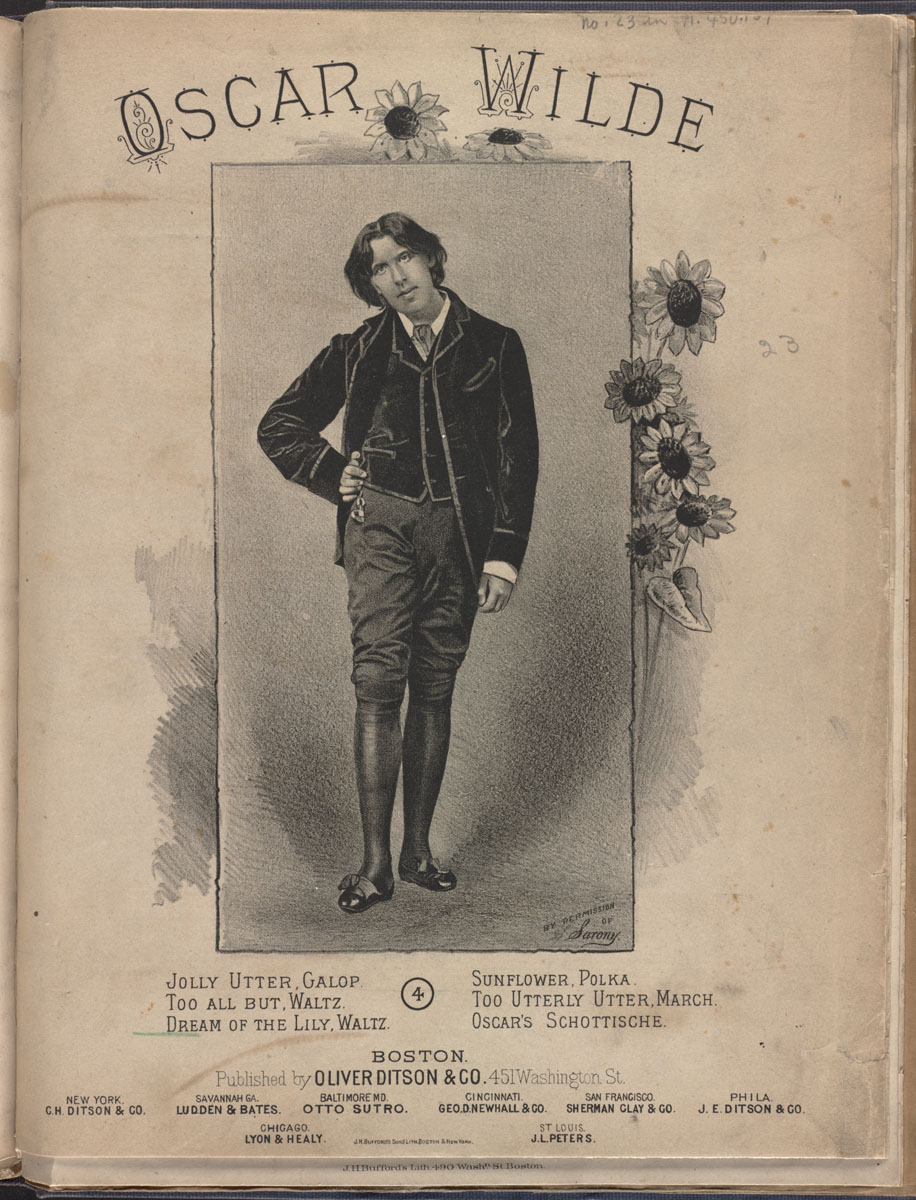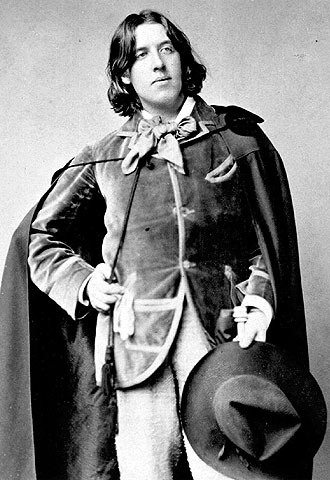- Profession: Writer, poet.
- Residences: Ireland.
- Relation to Mahler:
- Correspondence with Mahler:
- Born: 16-10-1854 Dublin, Ireland.
- Died: 30-11-1900 Paris, France.
- Buried: Paris, France. Wilde was initially buried in the Cimetière de Bagneux outside Paris. In 1909 his remains were disinterred and transferred to Pere Lachaise cemetery, Paris, France.
Oscar Fingal O’Flahertie Wills Wilde was an Irish author, playwright and poet. After writing in different forms throughout the 1880s, he became one of London’s most popular playwrights in the early 1890s. Today he is remembered for his epigrams, his novel The Picture of Dorian Gray, his plays, as well as the circumstances of his imprisonment and early death.
Wilde’s parents were successful Anglo-Irish Dublin intellectuals. Their son became fluent in French and German early in life. At university, Wilde read Greats; he proved himself to be an outstanding classicist, first at Dublin, then at Oxford. He became known for his involvement in the rising philosophy of aestheticism, led by two of his tutors, Walter Pater and John Ruskin. After university, Wilde moved to London into fashionable cultural and social circles. As a spokesman for aestheticism, he tried his hand at various literary activities: he published a book of poems, lectured in the United States and Canada on the new “English Renaissance in Art”, and then returned to London where he worked prolifically as a journalist. Known for his biting wit, flamboyant dress and glittering conversation, Wilde became one of the best-known personalities of his day.
At the turn of the 1890s, he refined his ideas about the supremacy of art in a series of dialogues and essays, and incorporated themes of decadence, duplicity, and beauty into his only novel, The Picture of Dorian Gray (1890). The opportunity to construct aesthetic details precisely, and combine them with larger social themes, drew Wilde to write drama. He wrote Salome (1891) in French in Paris but it was refused a licence for England due to the absolute prohibition of Biblical subjects on the English stage. Unperturbed, Wilde produced four society comedies in the early 1890s, which made him one of the most successful playwrights of late Victorian London.
At the height of his fame and success, while his masterpiece, The Importance of Being Earnest (1895), was still on stage in London, Wilde had the Marquess of Queensberry prosecuted for libel. The Marquess was the father of Wilde’s lover, Lord Alfred Douglas. The charge carried a penalty of up to two years in prison. The trial unearthed evidence that caused Wilde to drop his charges and led to his own arrest and trial for gross indecency with other men. After two more trials he was convicted and imprisoned for two years’ hard labour. In 1897, in prison, he wrote De Profundis, which was published in 1905, a long letter which discusses his spiritual journey through his trials, forming a dark counterpoint to his earlier philosophy of pleasure. Upon his release he left immediately for France, never to return to Ireland or Britain. There he wrote his last work, The Ballad of Reading Gaol (1898), a long poem commemorating the harsh rhythms of prison life. He died destitute in Paris at the age of 46.

By 25 November Wilde had developed cerebral meningitis. Robbie Ross arrived on 29 November and sent for a priest, and Wilde was conditionally baptized into the Catholic Church by Fr Cuthbert Dunne, a Passionist priest from Dublin[169] (the sacrament being conditional because of the doctrine that one may be baptized only once – Wilde having been baptized in the Church of Ireland and having moreover a recollection of Catholic baptism as a child, a fact later attested to by the minister of the sacrament, Fr Lawrence Fox). Fr Dunne recorded the baptism:
As the voiture rolled through the dark streets that wintry night, the sad story of Oscar Wilde was in part repeated to me….Robert Ross knelt by the bedside, assisting me as best he could while I https://mahlerfoundation.org/wp-content/uploads/2023/06/MF-Projects-2.pngistered conditional baptism, and afterwards answering the responses while I gave Extreme Unction to the prostrate man and recited the prayers for the dying. As the man was in a semi-comatose condition, I did not venture to https://mahlerfoundation.org/wp-content/uploads/2023/06/MF-Projects-2.pngister the Holy Viaticum; still I must add that he could be roused and was roused from this state in my presence. When roused, he gave signs of being inwardly conscious… Indeed I was fully satisfied that he understood me when told that I was about to receive him into the Catholic Church and gave him the Last Sacraments… And when I repeated close to his ear the Holy Names, the Acts of Contrition, Faith, Hope and Charity, with acts of humble resignation to the Will of God, he tried all through to say the words after me.
Wilde died of cerebral meningitis on 30 November 1900. Different opinions are given as to the cause of the meningitis: Richard Ellmann claimed it was syphilitic; Merlin Holland, Wilde’s grandson, thought this to be a misconception, noting that Wilde’s meningitis followed a surgical intervention, perhaps a mastoidectomy; Wilde’s physicians, Dr. Paul Cleiss and A’Court Tucker, reported that the condition stemmed from an old suppuration of the right ear (une ancienne suppuration de l’oreille droite d’ailleurs en traitement depuis plusieurs années) and did not allude to syphilis.
Wilde was initially buried in the Cimetière de Bagneux outside Paris; in 1909 his remains were disinterred and transferred to Père Lachaise Cemetery, inside the city. His tomb was designed by Sir Jacob Epstein, commissioned by Robert Ross, who asked for a small compartment to be made for his own ashes which were duly transferred in 1950. The modernist angel depicted as a relief on the tomb was originally complete with male genitalia which have since been vandalised; their current whereabouts are unknown. In 2000, Leon Johnson, a multimedia artist, installed a silver prosthesis to replace them. In 2011, the tomb was cleaned of the many lipstick marks left there by admirers, and a glass barrier was installed to prevent further marks or damage.
The epitaph is a verse from The Ballad of Reading Gaol:
And alien tears will fill for him
Pity’s long-broken urn,
For his mourners will be outcast men,
And outcasts always mourn.



